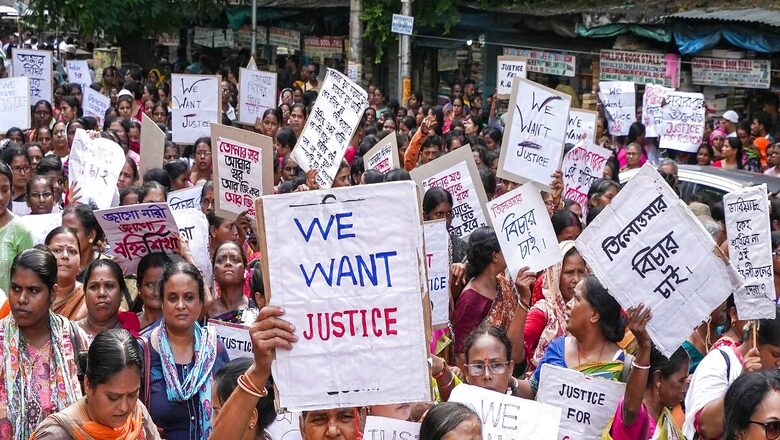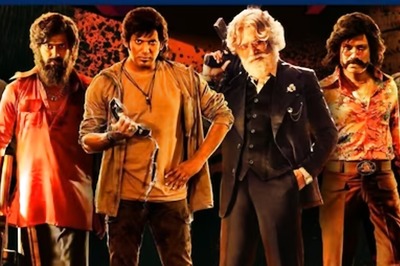
views
The brutal death of a second-year post-graduate student and trainee doctor at Kolkata’s RG Kar Medical College and Hospital on August 9, 2024, has profoundly impacted the conscience of West Bengal and the nation at large. Despite frequent incidents of violence and atrocities in West Bengal, often associated with Mamata Banerjee’s Trinamool Congress (TMC) government, this particular case—where a resident doctor was brutally attacked, raped, and murdered in the hospital’s seminar hall—has shocked the public and spotlighted corruption and sinister activities within the RG Kar Hospital.
Established in 1886 and named after philanthropist Radha Govinda Kar, the hospital was once a beacon of medical education and self-sufficiency. Now, it is infamous for mismanagement, harassment, corruption, and mysterious deaths of doctors. The shocking nature of this crime has brought the RG Kar Medical College and Hospital into the national spotlight.
The brutality of the assault, reminiscent of the Nirbhaya case, has sparked outrage and raised concerns about the depths of human inhumanity. The incident has sent shockwaves through West Bengal, leading to widespread protests in Kolkata demanding justice for the victim, referred to here as Dr Abhaya. These protests quickly escalated, reflecting deep-seated frustration with the TMC government’s governance and prompting an unprecedented level of public dissent. The intensity of these demonstrations has unsettled the TMC government, which is more accustomed to a subdued opposition.
Under Mamata Banerjee’s rule, Bengal’s political climate has often been described as harsh and undemocratic, with accusations of corruption, human rights violations, and systemic failures. The public’s fear of political repression and corruption has been simmering for years, exacerbated by issues such as illegal immigration, poverty, and political violence. The current protests signal a shift in public sentiment, as people, long subdued by fear, are now voicing their demands for change.
Mamata Banerjee’s government is now grappling with the intensity of these protests. The public’s defiance in the face of police crackdowns and other forms of repression has made the situation more precarious for her administration. The Supreme Court’s and CBI’s involvement provides a glimmer of hope for the people of Bengal, but the real test will be how the state government responds to the demands for justice and reform.
Mamata Banerjee’s response has been notably subdued, as she faces scrutiny over the administration of RG Kar Hospital, a government institution under her health ministry. The gravity of the situation, coupled with the approaching Assembly elections of 2026, has put her in a precarious position.
Doctors initially led the protests, highlighting poor working conditions and systemic corruption within the healthcare system. Dr Abhaya’s tragic death has shed light on the broader issues plaguing RG Kar Hospital and similar institutions. The protests have resonated beyond the medical community, drawing in the educated middle class of Bengal, who are now also voicing their discontent. This public movement marks a significant departure from previous periods of political passivity in Bengal. The protests have united people against a regime they feel has regressed the state, drawing comparisons with the CPI(M) era and demonstrating a readiness to challenge the current government.
The TMC has attempted to deflect blame onto the BJP, accusing them of politicising the tragedy, but the public’s dissatisfaction with the state government remains palpable. The BJP, as the primary Opposition, faces pressure to address the grievances of the people and hold the state government accountable.
Bengal’s political culture, characterised by informed and active public discourse, has fostered a climate where the populace is acutely aware of and responsive to political issues. The current unrest reflects a broad rejection of TMC governance, with even its supporters recognising the dangers posed by the state’s deteriorating security environment.
The lack of substantial response from Opposition leaders outside Bengal reveals their political constraints and underscores the public’s disillusionment with the broader political landscape. The death of Dr Abhaya has exposed systemic flaws and triggered a critical moment for Bengal. The ongoing protests will determine whether this collective movement can sustain momentum and drive meaningful change, or whether the state will return to its previous state of political stagnation.
The future of Bengal will hinge on how its people navigate this moment of truth and the actions they take in the face of corruption and governance failure.
The author is a columnist, educationist, social worker, advisor to Indian and foreign organisations and trainer and mentor of senior executives in corporate India. She is also a member of the BJP. Views expressed in the above piece are personal and solely those of the author. They do not necessarily reflect News18’s views.



















Comments
0 comment